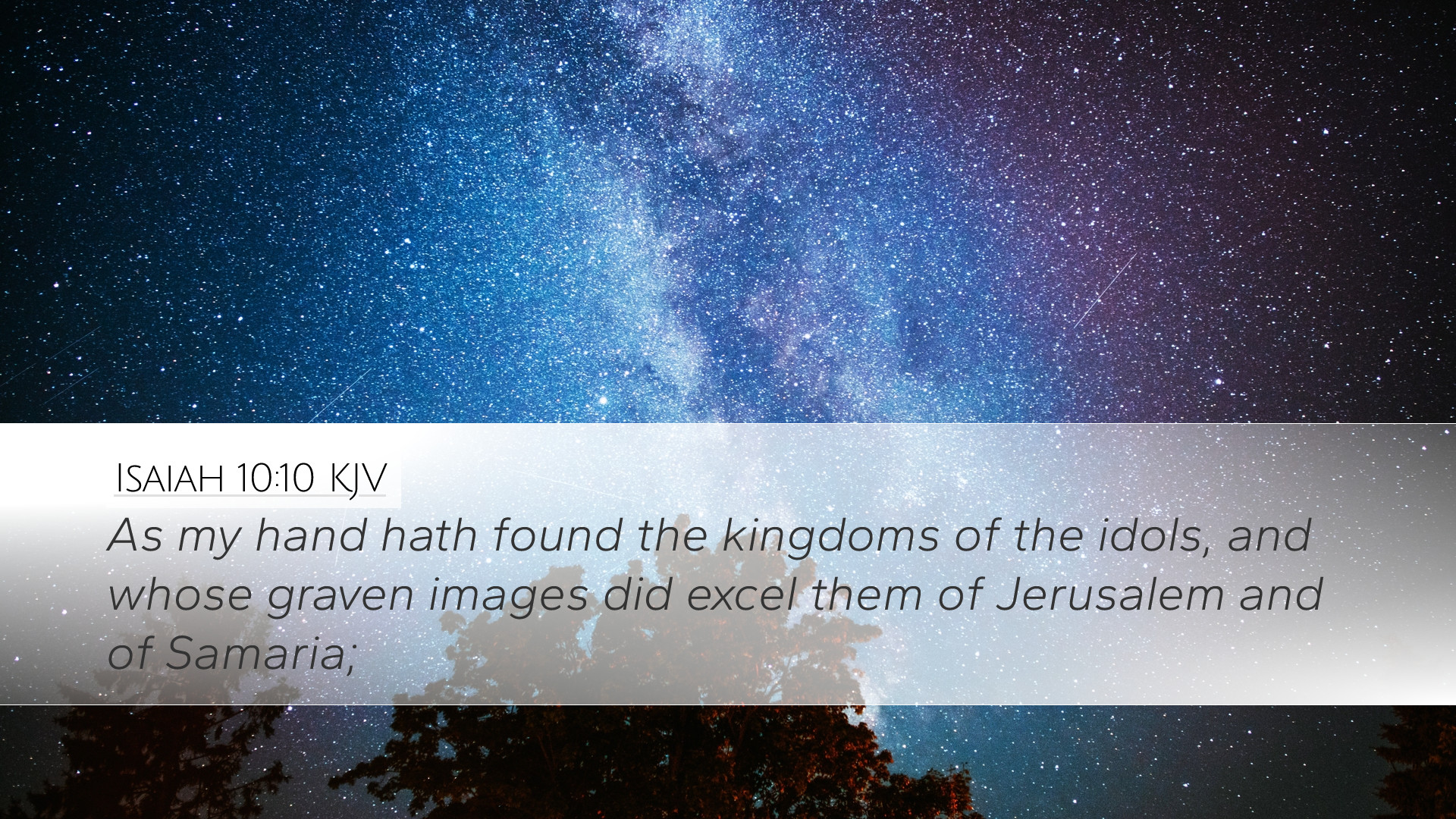Commentary on Isaiah 10:10
Isaiah 10:10 states, "As my hand hath found the kingdoms of the idols, and whose graven images did excel them of Jerusalem and of Samaria." This verse occurs within a broader prophetic context where God, through Isaiah, addresses the ambitions and arrogance of Assyria, symbolizing a larger theme of divine judgment and supremacy over all nations.
Context and Historical Background
The Assyrians, known for their military conquests, prided themselves on their strength and the idols they worshipped. By Isaiah's time, they had subdued numerous kingdoms, including Israel and Judah. This made their testimony a stark contrast to the worship of Yahweh in Jerusalem. This verse seeks to expose the delusion of relying on worldly power and the superiority of idol worship in comparison to true worship of the Lord.
Key Insights from Public Domain Commentaries
Matthew Henry's Commentary
Matthew Henry emphasizes the arrogance of the Assyrians in their self-glorification and overestimation of their power. He points out that their hand found the kingdoms of the idols, highlighting their conquest and the way they attributed success to their deities, which were, in essence, powerless compared to the true God. Henry argues that this verse reflects the folly of idolatry, where nations exalt false deities over the omnipotent creator.
Albert Barnes' Notes on the Bible
Albert Barnes provides a deeper analysis of the Assyrian military campaigns, noting that the reference to their found "kingdoms of the idols" symbolizes the nations that had fallen because they placed their confidence in false gods. He asserts that the Assyrians were ignorant of the fact that their victories were orchestrated under God's sovereign will, rather than the might of their idols. Barnes highlights the contrast between the impotence of these idols and the true strength of God.
Adam Clarke's Commentary
Adam Clarke elaborates on the phrase "whose graven images did excel them of Jerusalem and Samaria." He refers to the superiority that the Assyrians claimed over the nations they conquered, particularly focusing on the engraved images of the idols that they believed to be superior to the worship practices in Zion. Clarke indicates that this reflects a profound misunderstanding of divine authority and challenges the belief systems surrounding these idols. He indicates the futility in the imitation of Israel's worship in these captured nations.
Theological Implications
This verse invites theological reflection on the nature of power and supremacy. The mood extends beyond historical events to underscore a spiritual principle that resonates throughout Scripture: God ultimately reigns over all human affairs, and what may appear as victory through worldly strength is ephemeral compared to God’s everlasting authority.
- Divine Sovereignty: The text illustrates that God uses the seemingly powerful to fulfill His purposes, even when they operate under a guise of strength.
- Idolatry Exposed: The passage serves as a reminder of the futility of relying on created things rather than the creator.
- Covenant Relationship: Those in covenant with God can expect that their trust in Him will ultimately be vindicated over time.
Practical Applications for Pastors, Students, and Scholars
The implications of Isaiah 10:10 are manifold, offering insights that can be utilized in both theological studies and pastoral care:
- Encouragement in Preaching: Pastors can draw from this text to encourage congregants to remain steadfast in their faith, despite the apparent triumphs of worldly systems that may seem to overshadow God's truth.
- Cultivating Discernment: Students and scholars can analyze this verse to explore the contemporary relevance of idolatry in modern culture, promoting awareness of modern "idols" that distract from true worship.
- The Importance of Repentance: This verse can serve as a call to examine personal and national commitments to God, urging a return to faithfulness and reliance on Him rather than on material or ideological deities.
Conclusion
Isaiah 10:10 is a powerful reminder of the dangers of idolatry and the false confidence that worldly powers can engender. It encourages a deeper reliance on God, who orchestrates the affairs of nations and individuals alike, revealing the true nature of authority and power. As we reflect on this passage, let us reaffirm our commitment to worship the one true God above the idols of our age.


